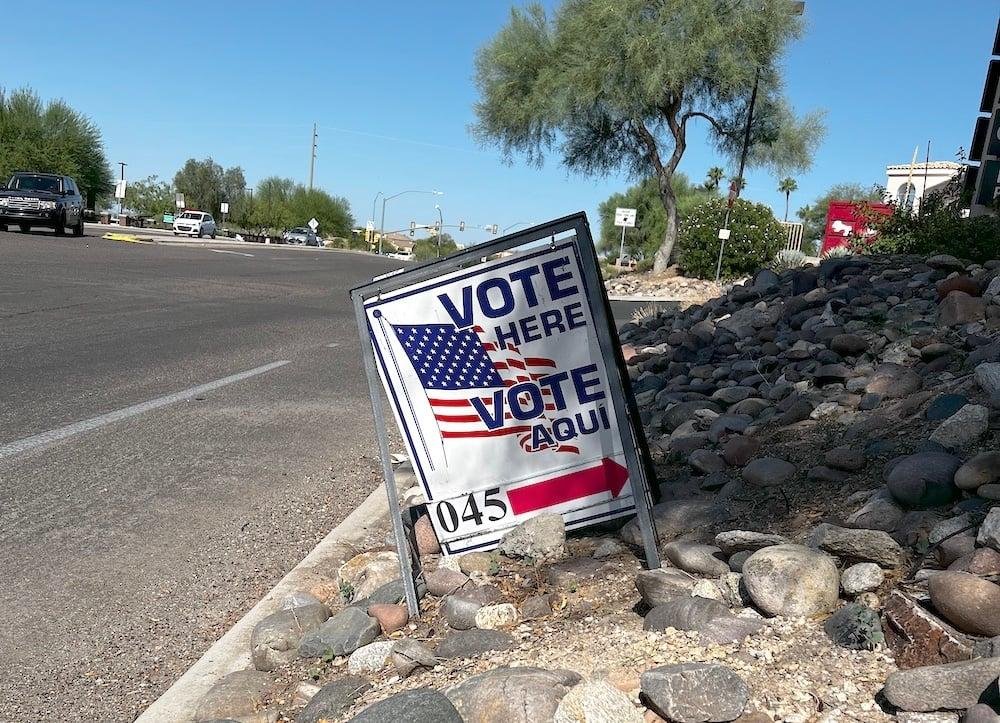arizona
Supporters of Arizona Open Primaries Ballot Measure Sue Over ‘Deceptive’ Description

The proponents of a transformative ballot initiative aiming to overhaul Arizona’s election laws have filed a lawsuit against state lawmakers, accusing them of disseminating misleading information that could confuse voters.
Sarah Smallhouse, chairperson of the Make Elections Fair Arizona Act campaign, stated that lawmakers ignored her campaign’s request to revise the measure’s description, as sustaining the current system would benefit them. “It’s unsurprising that none of the 14 legislators on the Council agreed to adopt our proposed changes to clarify their analysis and describe the most important elements of the initiative first,” Smallhouse noted. “As the beneficiaries of the current electoral process we are proposing to change, the Council each have an inherent conflict of interest.”
Earlier this month, the Make Elections Fair Arizona Act submitted a surplus of signatures far exceeding the required amount to appear on the November ballot. While verification is pending, it’s anticipated that the initiative will go before voters. The act proposes eliminating partisan primaries. All candidates, regardless of party affiliation, would appear on the same ballot. This could lead to races becoming more competitive, upending previous expectations.
Before voters can consider the act in November, election officials need to distribute voter information pamphlets, which include descriptions of each ballot proposal. Lawmakers are responsible for drafting and approving these summaries. Supporters of the Make Elections Fair Act contend that lawmakers approved a misleading summary, contrary to Arizona law.
On July 8, a legislative committee comprised of eight Republicans and six Democrats approved a summary of the act, which emphasized ranked choice voting (RCV) in the initial paragraph. The description states, “The proposition would amend the Arizona Constitution to: 1. Allow for the use of voter rankings at all elections held in this state to determine which candidate received the highest number of legal votes.”
Ranked choice voting allows voters to rank candidates by preference. If no candidate wins a majority, the candidate with the fewest votes is eliminated, and the votes are redistributed until a winner emerges. Initially, the campaign aimed to establish RCV in the state constitution, but refocused after an Arizona State University survey showed limited support for RCV, while primary election reforms received broad backing. RCV remains an option in general elections under the initiative, dependent on legislative and gubernatorial approval.
Under the act, if an office can be held by a single person, such as governor or state attorney general, between two and five candidates would advance to the general election. For offices like the Arizona House of Representatives, which have multiple seats, four to seven candidates would move forward.
Campaign lawyers argue that leading the summary with RCV inflates its importance and obscures the act’s primary goal: to reform primary elections. “The adopted analysis improperly amplifies those permitted changes and understates the Initiative’s required changes to the primary-election procedures,” the brief states. The lawsuit also notes that ballot order can influence voter choices, implying the same effect occurs in pamphlet summaries.
The lawsuit highlights that GOP lawmakers have referred their own anti-RCV measure to the ballot as a direct counter. They argue that the approved summary violates Arizona law, which mandates impartial summaries. Courts have ruled that partisan language or advocacy against a ballot measure is unlawful. “The decision to amplify voter rankings over the mandated changes to primary elections has no rational basis,” attorneys argue. “This choice resulted in a biased analysis that buries the primary-election reforms the Initiative requires.”
Senate President Warren Petersen, a Gilbert Republican, defended the summary as a product of a non-partisan process. “It was drafted by the non-partisan and unbiased Legislative Council,” he said. The Legislative Council includes both Republican and Democratic lawmakers but is chaired by Republican Speaker of the House Ben Toma and holds a Republican majority.
The lawsuit seeks to prevent the description from appearing in the voter pamphlet and demands that lawmakers write a more impartial summary. They also request reimbursement of legal fees if they prevail in court.
This isn’t the sole legal challenge lawmakers face. Recently, supporters of the Arizona for Abortion Access Act sued GOP leaders over a partisan summary of their ballot measure. Republicans had included the term “unborn human being” in the summary, which critics argue breaches the impartiality required by state law.
















